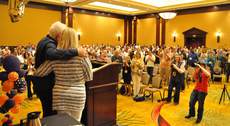This article was recently featured on a web blog, Words Fail Me, at the Psychology Today website. Reprinted with permission. Photos by David Alpuche. The author, Aman Kumar, attended the National Stuttering Association Conference in Ft. Worth, Texas in July.

This weekend saw the annual conference of the National Stuttering Association, the largest gathering of stutterers in the world. To roam the convention center during the event was to step into an alternate reality: stuttered speech was the norm, fluent speakers the minority, and simple sentences lasted anywhere from seconds to minutes. In between panels and workshops I met over a thousand fellow stutterers, each deeply engrossed in conversation with one another, each stuttering in a slightly different way. They “blocked” on words for different durations, had difficulty with different phonemes, and employed different therapy techniques to recover. Some stutterers would r-r-repeat sounds intentionally, bouncing over the troubling syllable to literally build “momentum” into the next. Others like myself would barrel headlong into the difficult syllable and only then try to relax out of it. As some faces grew increasingly contorted, others took great gasps of air. Some had involuntary facial tics, others tapped out a rhythm.
Yet underneath the euphoria lay a quiet and determined resolve of immeasurable strength and haunting clarity.
I saw this resolve in the compassion of a roundtable introduction of stutterers who would not excuse a woman from saying her own name. Though it took a full 10 minutes as she struggled with increasing desperation — her eyes pleading for them to say it for her — in silent agreement they refused to deny her the ultimate satisfaction of overcoming the excruciating block unassisted.
I saw this resolve in groups of mothers to forgive themselves for — acting out of prior ignorance — demanding their children speak slower or less haltingly.
I saw this resolve in the dreams of teens and college students to become politicians and actors, determined not to allow their own physiology to dictate their career.

I saw this resolve in teams of visiting scientists, clinicians, and researchers to probe the genetic and neurological boundaries and dependencies of the disorder.
It is vital that organizations like the National Stuttering Association exist, for they provide deep insight into the human condition and a defiant repudiation of the prejudices of both society and stutterers themselves.
For stutterers it is an immediate and visceral validation that we are not alone, that stuttering appears in people of all ages and races and manifests itself in all shapes and sizes. Contrary to our collective fears, we will not lose our listeners’ patience or attention if we block for a few minutes. And it is indeed possible to run a conference with apparently infinite listening opportunity and yet have every workshop and discussion begin punctually; being late was no longer an excuse not to speak. For the first-time attendee who may never have met a fellow stutterer before, these insights are profoundly liberating.
For society at large it is an equally-incisive look at the debilitating inadequacy that stutterers experience, the vitriolic and often self-imposed cocktail of fear and shame pervading every interaction and the courage required to overcome it. There was a paradoxical coherence to the “alternate reality” of a gathering in which stuttered speech was the norm: any fluent speaker, to truly understand fluency, should experience once an environment surrounded by dysfluency. Not one fluent attendee came out unmoved.
Ultimately the organization and conference managed to be many things to many people: a beacon of hope for those in need, a crash course for the uninformed, a confessional for the burdened and a cathartic connective fabric for all. This disorder inspires a special kind of compassion and nobility for those touched or influenced by it; one particularly enlightened stutterer entreated everyone he met to soldier on “not for yourself, but for the children.” Against the backdrop of stuttering's historically sorry status in society, the annual conference was in fact a microcosm of human perseverance and courage — our ultimate dignity, the best in us all.
Read Daniele Rossi's statement about the importance of conferences.
© 2011 Aman Kumar. All rights reserved.